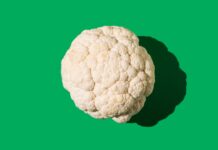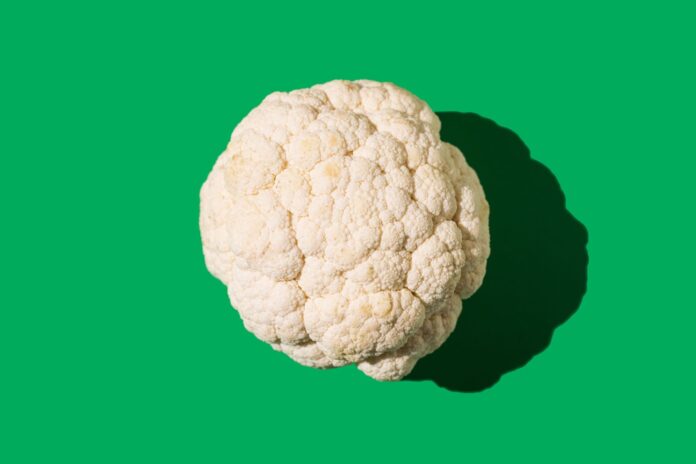Cauliflower, a versatile cruciferous vegetable, is more than just a bland side dish. Regular consumption delivers a wide range of health benefits, from supporting weight management to potentially slowing the aging process. This article breaks down the science-backed reasons why you should consider making cauliflower a staple in your diet.
Weight Management & Satiety
One of the simplest benefits is its impact on weight. A single cup of raw cauliflower contains only 30 calories and 5 grams of carbohydrates, yet provides 2.14 grams of fiber. This combination promotes fullness, helping you eat less overall. The high water content (approximately 3.5 ounces per cup) further contributes to satiety.
Reducing Inflammation & Oxidative Stress
Cauliflower is packed with bioactive compounds that actively reduce inflammation. Inflammation is a key driver of chronic diseases and premature aging. The vegetable also contains antioxidants, which neutralize free radicals – unstable molecules that damage cells. By balancing free radicals with antioxidants, cauliflower helps protect against oxidative stress, a major contributor to inflammation.
Nutrient Density: Vitamins, Minerals & More
Beyond low calories, cauliflower is a surprisingly rich source of essential nutrients. One cup delivers over 75% of the Daily Value (DV) for Vitamin C, crucial for immune function, collagen production, and DNA repair. It also provides significant amounts of Vitamin K (20% DV), important for bone health, and choline (10% DV), vital for brain function, memory, and muscle movement. Smaller amounts of B vitamins, magnesium, manganese, phosphorus, and potassium further contribute to overall health.
Lowering Chronic Disease Risk
Research consistently links cruciferous vegetable consumption (including cauliflower) to a reduced risk of heart disease and cancer. One review found a clear correlation between eating these vegetables and lower rates of both conditions, as well as overall mortality. Cauliflower contains compounds that protect blood vessels from inflammation, a major contributor to heart disease. Evidence suggests these same compounds may also inhibit the growth and spread of colorectal cancer.
Gut Health & Digestive Support
Most people don’t eat enough fiber. Experts recommend 25-38 grams daily, yet intake is often far lower. Cauliflower is an easy way to boost your fiber intake, feeding beneficial gut bacteria that reduce inflammation and promote regularity. A healthy gut microbiome is linked to improved immune function, mental health, and overall well-being.
Slowing the Aging Process
Emerging research suggests cauliflower may influence genes in ways that slow biochemical aging. Sulforaphane, a natural compound found in cauliflower, neutralizes toxins, reduces inflammation, and protects DNA. One study even suggests it may protect the brain and slow age-related cognitive decline.
Low-Carb Alternative & Detoxification Support
For those following low-carb diets (like keto), cauliflower is a valuable substitute for high-carb foods like white rice. A ¾-cup portion of riced cauliflower contains only 15 calories and 3 grams of carbs, compared to 242 calories and 53.2 grams in the same amount of white rice.
Cauliflower also supports natural detoxification processes. It contains enzymes that bind to toxins and waste products, escorting them out of the body.
Nutritional Breakdown (Per 1 Cup Raw)
- Calories: 26.8
- Fat: 0.3g (0.4% DV)
- Sodium: 32.1mg (1.4% DV)
- Carbohydrates: 5.3g (1.9% DV)
- Fiber: 2.1g (7.5% DV)
- Protein: 2.1g (4.2% DV)
Potential Drawbacks & Considerations
Cauliflower is a high-FODMAP food, meaning it contains short-chain carbohydrates that can trigger digestive issues (gas, bloating, diarrhea) in sensitive individuals, particularly those with Irritable Bowel Syndrome (IBS). If you experience these symptoms, moderate your intake or consult a healthcare professional.
How to Incorporate More Cauliflower Into Your Diet
- Add it to smoothies: Cauliflower blends well without significantly altering the taste.
- Roast with herbs and spices: A simple, flavorful side dish.
- Use it in baked goods: Cauliflower can replace some flour in cakes, brownies, and muffins.
- Make cauliflower mash: A lower-carb alternative to mashed potatoes.
- Rice it and use it instead of rice: A versatile base for stir-fries and other dishes.
Ultimately, incorporating cauliflower into your diet is a simple yet powerful way to improve your health, reduce your risk of chronic diseases, and potentially slow the aging process



































